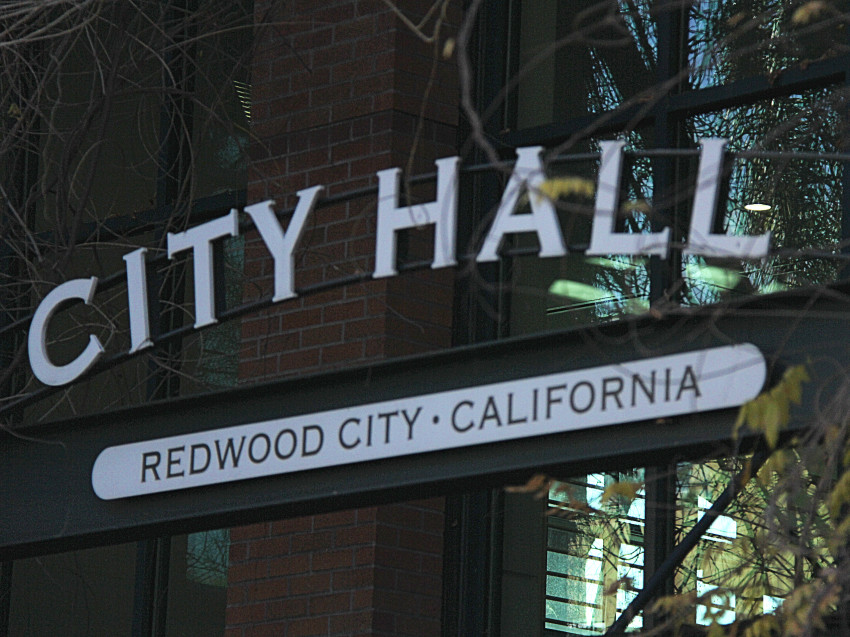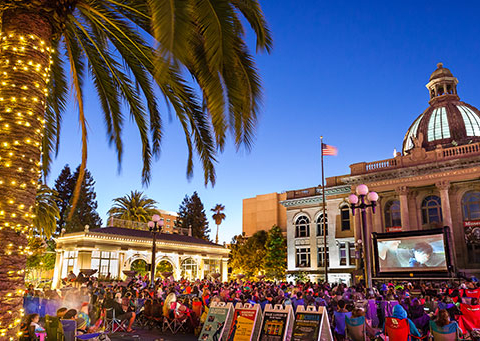No doubt, after five months of Sheltering In Place, you are hungry for something new and different. Well, my friends, you have come to the right place. Political Climate is back for the duration, which runs through November 3, and I’m happy to be your tour guide. My sustaining philosophy is informed by the classic line from “All About Eve,” uttered in that Bette Davis way by, of all people, Bette Davis: “Fasten your seatbelt. It’s going to be a bumpy ride.”
Indeed. It is Redwood City’s first foray into district elections and there are four City Council seats on the ballot. Three of the seats are contested and two feature incumbents who don’t get to be called incumbents anymore because they were elected citywide, but now are running in districts. So, according to their ballot designations, we should use councilmember when referring to Alicia Aguirre and Janet Borgens. Which certainly has the same semantic effect as incumbent, but there you go. It’s a brave new world.
If you did the math, one district seat is uncontested, and congratulations to Planning Commissioner Michael Smith. In fact, the City Council is meeting Monday for the sole purpose of conceding the seat to Smith and bypassing the election. It’s supposed to save a modest chunk of change, but it’s an interesting way to initiate the new districts over which the council labored so. I think if I were Smith, I’d want to have my name on the ballot — start off that political career with an affirmation from the voters. But that’s just me.
Smith will represent District 4, which takes in the Five Points area and is one of two minority-majority districts: 77 percent of residents are Hispanic, 80 percent are renters, and education and income levels are among the lowest in the city.
Smith has been in the Bay Area only four years and is only two years into his first term on the Planning Commission. But he has established himself quickly as a community activist, serving a wide range of city and neighborhood organizations. Apparently, that was enough to discourage opposition in a district that could have been expected to attract a Latino candidate.
It is understandable, however, that a community denied a fair share of representation on the council and city boards and commissions will need some time to build up a bench of eventual candidates. Meanwhile, Smith brings a fresh energy to a district where residents long have felt overlooked.
A WHOLE NEW BALLGAME: The other three districts not only are contested but promise to be competitive campaigns. The 2018 city council campaign also was competitive — seven candidates running for three seats. But it was a citywide election, which meant it was difficult for some candidates to separate themselves from the crowd. It also was a testy election, a proving ground of factional disputes over development and growth that often became quite personal, particularly behind the scenes. In that citywide election, oddly enough, the agenda was dominated by a small group of advocates.
The new political setting will be quite different and the ability to influence the council or the election is spread out, which was the idea. Residents of District 1, the Redwood Shores district, are going to have priorities, including views on development and housing growth, that differ dramatically from residents in the Farm Hill area of District 7 or the Friendly Acres area of southernmost District 3, not to mention such issues as rent control or sea level rise.
And all of this is overlaid by Covid-19 and a community still under quarantine — to devastating effect on the city’s economic well-being. Candidates can, and will, run on a variety of issues that are also highly localized. But whatever issues they raise, whatever promises they make, the council that convenes in December is going to spend most of its time making budget cuts and frantically seeking ways to bail out a city with an annual shortfall of $10 million.
The fiscal effects of the pandemic not only will dominate the new city council — with, possibly, a brand new majority — but it will have a huge impact on the campaign, or, more precisely, how the candidates will campaign. One of the benefits of districts is that candidates can knock on every door, sometimes more than once. Campaigns are much more personal, and, likely, much less costly. A pandemic would seem to make face-to-face campaigning less inviting. Mask-to-mask campaigning?
NEW LIMITATIONS: That would tilt 2020 campaigning toward mail and online messages, which take money. But the other new wrinkle is a campaign donation limit of $1,000, which took effect in mid-March, right around the time most of us were being told to go home and to stay there.
The donation limit already has made its presence felt in the form of hurried-up contributions. Julie Pardini, the prime force behind the residentialist-inclined Facebook page of Redwood City Residents Say What?, has given $5,000 to Chris Rasmussen, the retired cop who is challenging Aguirre in District 7.
The donations by Pardini to Rasmussen were made on February 4 ($1,000) and March 1 ($4,000). The new donation limit took effect on March 11. Rasmussen said the donations were legal at the time and that makes them acceptable to him.
Borgens also got $2,000 from Pardini on March 9, just two days before the new law took effect. But Borgens returned $1,000 with a note on her campaign finance report that Pardini “already contributed the maximum amount.” Borgens acknowledged she didn’t have to give back half the money, but she said she served on the council committee that recommended the limit and she felt she should observe the spirit of the new law.
Rasmussen also received two contributions totaling $2,000 from Christina Umhofer, a losing council candidate in 2018. The first donation was on January 24 ($1,000). The second was on May 28 ($1,000) from her 2018 council campaign committee.
The cumulative donations are legal, according to City Attorney Veronica Ramirez, speaking through city Communications Director Jennifer Yamaguma. The first donation occurred prior to the new law and does not count as part of the aggregate amount contributed by Umhofer.
SOMETHING OLD, SOMETHING NEW: The goal of moving to district elections — whether coerced or by choice — is to invite more diversity among candidates, not just demographically, but politically. Certainly, there are new faces in the three contested districts, but also some familiar ones. And there is a new electorate, if you will. From the analytical work done in creating the new districts, we know something about population and voting trends from past elections. What we don’t know is how true that will be this time.
And, so, we are off to the races. Ordinarily, campaigns avoid too much activity until after Labor Day, but these certainly are not ordinary times. I’ll dive into the contested races in my next missive. Meanwhile, and to tide you over, remember that old saying, “May you live in interesting times.”
Contact Mark Simon at mark.simon24@yahoo.com.
*The opinions expressed in this column are the author’s own and do not necessarily reflect the views of Climate Online.






